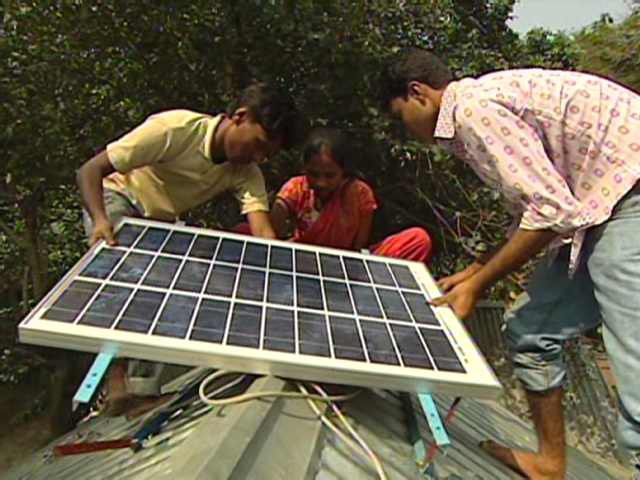
World Bank Bringing Solar Power to Over 1 Million Homes, Shops in Rural Bangladesh
Only around 1/3 of rural residents in Bangladesh have access to electricity. Some 16 million homes have yet to be connected to an electricity grid. That’s changing fast with help from the World Bank.
On October 4, the World Bank’s International Development Association (IDA) approved a $172 million credit facility to support installation of solar power and other renewable energy ‘mini-grid’ systems for as many as 630,000 more homes in rural Bangladesh.
The funds add to the IDA’s Rural Electrification and Renewable Energy Development Project (RERED) in Bangladesh, which aims to install solar power systems on more than 1 million rural Bangladeshi homes and businesses by 2012. This latest financing follows an additional $130 million the World Bank awarded RERED in December, 2009.

More than 300,000 solar home systems have already been installed via the IDA’s RERED program. The latest IDA credit facility has a 40-year term to maturity with a 10-year grace period and carries a 0.75% service charge.
RERED in Bangladesh, and Around the World
On the ground in Bangladesh, the program’s being carried out by the Infrastructure Development Co. (IDCOL), a financial institution owned by the Bangladeshi government. Partner organizations, primarily non-profit NGOs, install the solar power systems.
“More than a million homes and shops in remote areas have installed solar home systems with support from the World Bank and other development partners. Such systems are the most suitable for remote and dispersed communities which the grid connection cannot reach.” said Ellen Goldstein, World Bank country director for Bangladesh in a press release.
“The solar home systems have already improved the quality of life of millions of people in Bangladesh and provided opportunities for new village enterprises.’’
The IDA’s RERED program is helping bring clean, renewable energy and rural economic development Afghanistan, Cambodia, Malawi, Tanzania, Uganda and Yemen, as well as Bangladesh.
The IDA program’s been up and running for a decade in Bangladesh. In addition to financing installation of solar power systems, it funds grid connection efforts.
It’s also helped design and implement an energy efficiency program, the Efficient Lighting Initiative, that set set a one-day record by distributing 5 million compact fluorescent light bulbs (CFL) in a single day, potentially reducing electricity demand by 50 megawatts (MW). The IDA helped Bangladesh obtain Carbon Financing for the project and is working with the government to build CFL manufacturing facilities to meet replacement CFL demand.
(Source)
